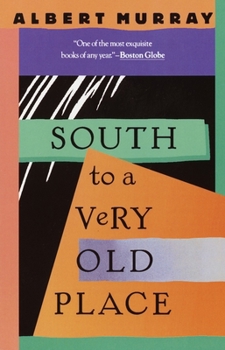South to a Very Old Place
Select Format
Select Condition 
Book Overview
The highly acclaimed novelist and biographer Albert Murray tells his classic memoir of growing up in Alabama during the 1920s and 1930s in South to a Very Old Place . Intermingling remembrances of youth with engaging conversation, African-American folklore, and astute cultural criticism, it is at once an intimate personal journey and an incisive social history, informed by "the poet's language, the novelist's sensibility, the essayist's clarity, the jazzman's imagination, the gospel singer's depth of feeling" ( The New Yorker ). "His perceptions are firmly based in the blues idiom, and it is black music no less than literary criticism and historical analysis that gives his work its authenticity, its emotional vigor and its tenacious hold on the intellect. . . . [It] destroys some fashionable sociopolitical interpretations of growing up black."--Toni Morrison, The New York Times Book Review
Format:Paperback
Language:English
ISBN:0679736956
ISBN13:9780679736950
Release Date:September 1991
Publisher:Vintage
Length:240 Pages
Weight:0.65 lbs.
Dimensions:0.6" x 5.0" x 8.7"
Customer Reviews
2 ratings
South to a Very Old Place
Published by Thriftbooks.com User , 25 years ago
If Langston Huges is the poet laureate of Jazz, then Albert Murray is its scribe. Murray's indelible style continues in this wonderful trip down South. Murray grew up in Mobile, Alabama, after high school he went to Tuskegee Institute then on to the military where he was the first black to become an officer in US Air Force history. After retiring from the Air Force Murray settled in New York City where he lives today. A number of years ago Murray's publisher suggested that he go home and write about the differences in Mobile before WWII and Mobile now. Murray takes the reader along with him on his trip through his own personal history with remarkable rhythm. There are any number of notable sequences including the first paragraph which destined to join the ranks of "Call me Ishmael" and "It was the best of times it was the worst of times..." Another striking point in the novel is when Murray checks into a celebrated hotel in his hometown and his bags are carried by a young white boy who calls him sir and mister. It is contrast against Murray's memories of this same hotel that he was not allowed to enter when he was a boy because he was black. The book also includes plenty of the rhythmic writing that has made Murray one of America's most cherished authors.
South to a Very Old Place
Published by Thriftbooks.com User , 25 years ago
If Langston Huges is the poet laureate of Jazz, then Albert Murray is its scribe. Murray's indelible style continues in this wonderful trip down South. Murray grew up in Mobile, Alabama, after high school he went to Tuskegee Institute then on to the military where he was the first black to become an officer in US Air Force history. After retiring from the Air Force Murray settled in New York City where he lives today. A number of years ago Murray's publisher suggested that he go home and write about the differences in Mobile before WWII and Mobile now. Murray takes the reader along with him on his trip through his own personal history with remarkable rhythm. There are any number of notable sequences including the first paragraph which is destined to join the ranks of "Call me Ishmael" and "It was the best of times it was the worst of times..." Another striking point in the novel is when Murray checks into a celebrated hotel in his hometown and his bags are carried by a young white boy who calls him sir and mister. It is contrast against Murray's memories of this same hotel that he was not allowed to enter when he was a boy because he was black. The book also includes plenty of the rhythmic writing that has made Murray one of America's most cherished authors.





